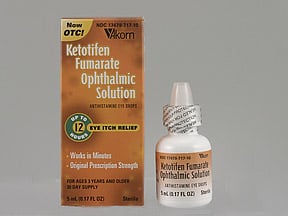
Zaditor Coupons & Savings Card – Discount Prices from $15.55
Brand for: Ketotifen
My prescription
Edit
5ML of 0.035%, Ketotifen (1 Bottle)
Select pharmacy

Walgreens
$15.55
COUPON PRICE
Albertsons
$21.99
COUPON PRICEZaditor savings card
Show this card to your pharmacist
Walgreens
$15.55
BIN
ID
PCN
GRP
019876
LHFE833D2C
CHIPPO
LHX
Powered by
Related antihistamines prescriptions
More prescriptions for allergic conjunctivitis
Related antihistamines prescriptions
More prescriptions for allergic conjunctivitis
Zaditor (Ketotifen) dosage forms
Dosage Quantity Price from Per unit 5ML of 0.035% 1 Bottle $15.55 $15.55 5ML of 0.035% 2 Bottles $22.10 $11.05 5ML of 0.035% 3 Bottles $28.65 $9.55
| Dosage | Quantity | Price from | Per unit |
|---|---|---|---|
| 5ML of 0.035% | 1 Bottle | $15.55 | $15.55 |
| 5ML of 0.035% | 2 Bottles | $22.10 | $11.05 |
| 5ML of 0.035% | 3 Bottles | $28.65 | $9.55 |
What is Zaditor used for?
Zaditor is used to relieve itchy eyes caused by allergies. It is an antihistamine eye drop that helps reduce the effects of histamine, a substance in the body that can cause allergic symptoms.
Which is better, Alaway or Zaditor?
Both Alaway and Zaditor are over-the-counter antihistamine eye drops used to relieve itchy eyes due to allergies. They contain the same active ingredient, ketotifen, and are generally considered equally effective. The choice between them may depend on personal preference, availability, or cost. It is advisable to consult with a healthcare provider for personalized recommendations.
Can you use Pataday and Zaditor at the same time?
It is generally not recommended to use Pataday and Zaditor at the same time without consulting a healthcare professional. Both medications are antihistamine eye drops used to relieve allergy symptoms, and using them together may not provide additional benefits and could increase the risk of side effects. It is advisable to follow the guidance of an eye care specialist or healthcare provider for appropriate treatment.
Does Zaditor get rid of red eyes?
Zaditor is an antihistamine eye drop primarily used to relieve itchy eyes due to allergies. While it may help reduce redness associated with allergic reactions, it is not specifically formulated to eliminate red eyes. If redness persists, it is advisable to consult a healthcare professional for appropriate treatment.
Can I use Zaditor long-term?
Zaditor, an over-the-counter antihistamine eye drop, is generally considered safe for long-term use to manage symptoms of allergic conjunctivitis. However, it is advisable for individuals to consult with their healthcare provider to ensure it is appropriate for their specific condition and to rule out any underlying issues that may require different treatment. Regular follow-up with an eye care professional is recommended to monitor eye health.
